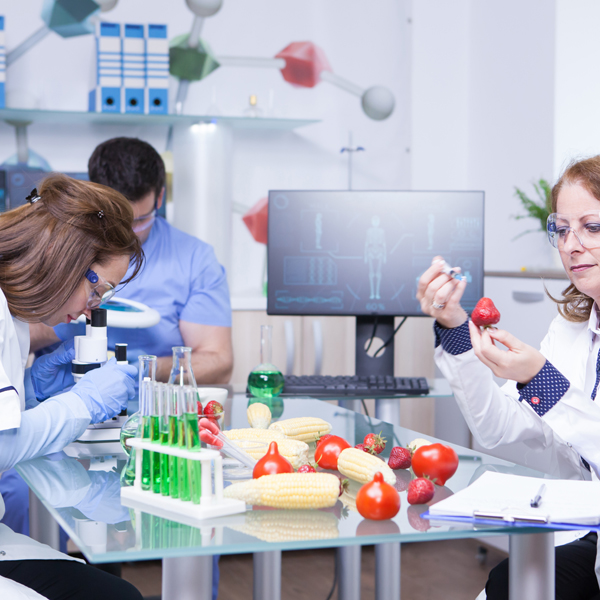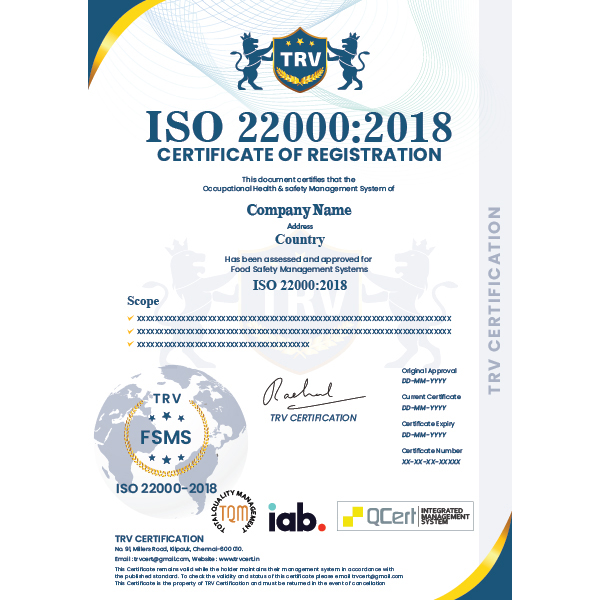Description
Achieve Food Safety Excellence with ISO 22000 Certification: A Comprehensive Guide
Are you looking to enhance food safety, improve customer satisfaction, and gain a competitive edge in the food industry? ISO 22000 certification is the answer. This comprehensive guide explains everything you need to know about ISO 22000, its benefits, implementation, and how TRV can help you achieve certification.
What is ISO 22000?
The ISO 22000 family of standards provides a globally recognized framework for Food Safety Management Systems (FSMS). These standards define the requirements for organizations across the food supply chain to effectively manage food safety hazards and ensure the safety of their products. Implementing an FSMS based on ISO 22000 involves developing robust standard operating procedures (SOPs) tailored to your specific operations. Maintaining meticulous records provides objective evidence of process effectiveness and consistent outcomes.
Key Benefits of ISO 22000 Certification:
- Enhanced Food Safety: Proactively identify and control food safety hazards, minimizing risks and protecting consumers.
- Improved Customer Satisfaction: Demonstrate a commitment to food safety, building trust and loyalty with customers.
- Increased Efficiency and Productivity: Streamlined processes and reduced errors lead to improved operational efficiency.
- Competitive Advantage: Gain a competitive edge by demonstrating compliance with a globally recognized standard.
- Reduced Costs: Prevent costly product recalls, returns, and legal issues.
- Compliance with Regulations: Meet statutory and regulatory requirements related to food safety.
- Risk and Opportunity Management: Proactively evaluate risks and opportunities to drive continuous improvement.
- Consistent Product Quality: Ensure products and services consistently meet customer requirements.
Who Can Implement ISO 22000:2018?
ISO 22000:2018 is a generic standard applicable to organizations of all sizes, across the entire food supply chain, including:
- Food manufacturers
- Food processors
- Food distributors
- Catering companies
- Packaging manufacturers
- Farming and agriculture
The ISO 22000:2018 Certification Process:
The ISO 22000:2018 certification process typically involves a three-year cycle with mandatory audits to ensure ongoing compliance. This process involves:
- Gap Analysis: Assessing your current systems against the ISO 22000 requirements.
- System Development: Developing and implementing your FSMS, including SOPs and record-keeping procedures.
- Internal Audit: Conducting an internal audit to verify the effectiveness of your FSMS.
- Certification Audit: Undergoing an external audit by a certification body to achieve ISO 22000 certification.
- Surveillance Audits: Periodic audits to maintain certification.
TRV’s Approach to ISO 22000 Certification:
At TRV, we are committed to helping our clients maximize the benefits of ISO 22000 certification. Our approach is based on three core principles:
- Make it Simple: We simplify the certification process, focusing on results that matter to your business.
- Make it Precise: We tailor the process to your specific business requirements, ensuring effectiveness and efficiency.
- Make it Work: We help you implement a sustainable FSMS that drives long-term improvements.
We guide you through each phase of the certification process, assisting with:
- Gap analysis
- Documentation development
- Implementation support
- Training
- Internal audits
- Management review
Our ultimate goal is to enhance customer satisfaction through the effective application of your FSMS, ensuring conformity to customer, statutory, and regulatory requirements.
Achieve Food Safety Excellence with TRV:
Partner with TRV and embark on your journey to ISO 22000 certification. Contact us today to learn more about how we can help you achieve food safety excellence and drive business success.








Reviews
There are no reviews yet.